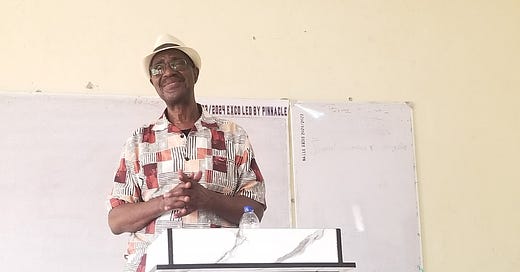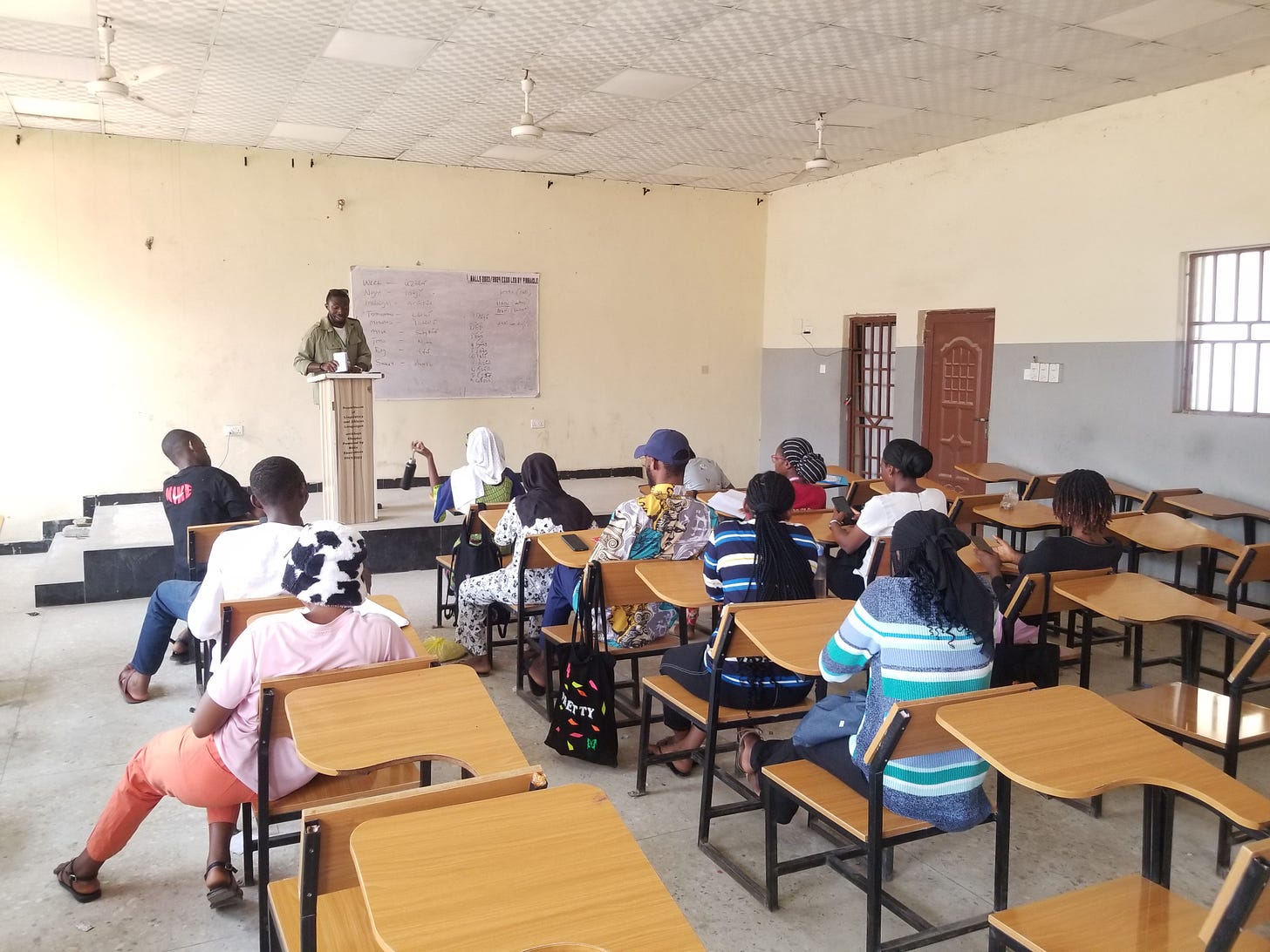Guosa: The language to unite West Africa strives on the tongues of Nigerian students
Part I: The number of speakers of a language can determine its place on the scale of language endangerment. Where will an artificial language with only a handful of student-learners fit?
Students emptied out of the linguistics classroom for Guosa language students to come in. Mr and Miss Guosa, Pius Omoha and Waliyat Badmus, and other students in the department of Linguistics and African Languages filed in, enthusiastic about today’s session because it’s not just one of the Wednesdays dedicated to teaching and learning new vocabulary and grammatical expressions in the constructed language on the campus of University of Abuja.
The language evolutionist/creator himself, Professor Alex Igbineweka, will be around to lead the session — the first of its kind after many years, and the first time current students will be meeting him physically after three years of online sessions together; him from the United Kingdom, the students from Nigeria.
Guosa language is just as ambitious as other constructed languages: it aims to serve as a lingua franca for West African nations.
“Kele-kele ka na ngbo Guosa”, Prof. Igbineweka said when he eventually mounted the podium, assuring the students that they will learn Guosa little by little.
Prof. Igbineweka leads a Guosa session in March, the first with current learners at the Linguistics classroom, University of Abuja.
Old students training new generation of learners
On the Wednesday Guosa learners were joined by the creator of the language was March 5, 2025.
The moment reminds Caleb Eluu of his first Guosa learning experience in 2019. As an undergraduate in the department of Linguistics and African Languages, Caleb is one among the 50 students who attended the train-the-trainers session facilitated by Prof. Igbineweka.
Mr. Caleb, a serving member of the National Youth Service Corps, leads a session in February.
Now an instructor at the Guosa language community, he recalls that he was approached to attend a Guosa session just like hundreds of others students, before “it took personal desire.”
Guosa… from a multilingual mouth
Tracing the origin of the constructed Guosa language to Prof. Igbineweka will be missing the mark.
Historically, artificial languages emerge to serve as a unified language of communication for the world or a particular geographical area. The creators of constructed languages –such as Esperanto by Dr. L. L. Zamenhof– are often ambitious.
Esperanto by Dr. Zamenhof and Guosa language by Prof. Igbineweka emerged from a multilingual, multi-ethnic society of Poland and Nigeria, respectively. Both attempt to remove communication barriers in their societies.
Guosa language is not limited to Nigeria; it emerges to serve as a potential lingua franca candidate in the Economic Community of West African States. If successful, Guosa will replace English, French and Portuguese —languages bequeathed by the colonialists — in the region with 12 linguistically-diverse countries inhabiting over 500 languages.
Conflicting Nigerian languages in Prof. Igbineweka’s fledgling mouth led him to conceptualize and construct Guosa, an a posteriori language which has Hausa, Igbo and Yoruba languages as its “tripod”, with other languages and dialects across Nigeria and West Africa forming its rich vocabulary.
“Growing up in Nigeria in the 1950s and 60s, I was repeatedly exposed to not only colonial English, the Nigeria Pidgin English and my mother tongue Edo, but also Igbo, Yoruba, Hausa, Efik, Urhobo, Izon, Kalabari, and Fulfude”, Òtòhén Igbineweka wrote in an address delivered on the occasion of 2024 annual Guosa language Cultural Day at Uni-Abuja.
The address was delivered before students and staff of the institution by Ambassador Lilian Uju, Guosa matron.
“I synced volumes of different Nigerian indigenous words and meanings in my brain as a young boy, and I was able to pronounce and recite those words with ease. Having acquired lots of different Nigerian traditional language words, I found myself interlacing Edo language words with Igbo words, and some other Nigerian languages and dialectical words.
“For example, “biko, fun mi ruwa”, meaning “please, give me water” became a common phrase on my lips, and that is a blended linguistic element from Yoruba, Igbo, Hausa and Itsekiri. Thus, at age 13, living in my family home at number 19 Abakaliki Road, Enugu, Nigeria, the Guosa language was born.”
The birth of Guosa, the initiatives to keep the language alive and to sustain it started over two decades ago; before Nigeria’s independence from the British.
Either Guosa language falls silent, like many artificial languages before it, or spreads depends largely on the language learners, most of whom the language is older than. They tell us what they think — in the forthcoming part II of this feature article.






Weldone my professor
GUOSA to the world
Wow
Amazing
What a good write up about our very own Guosa language 🔥🔥😍
Weldone👍👍